Monatomic ions - Study guides, Class notes & Summaries
Looking for the best study guides, study notes and summaries about Monatomic ions? On this page you'll find 59 study documents about Monatomic ions.
Page 3 out of 59 results
Sort by
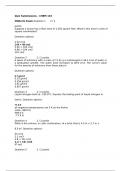
-
CHEM133 Week 7 Midterm Exam (March)
- Exam (elaborations) • 9 pages • 2023
- Available in package deal
-
- $39.99
- + learn more
1. Question: Suppose a house has a floor area of 2,250 square feet. What is this area in units of square centimeters? 2. Question: A piece of antimony with a mass of 17.41 g is submerged in 46.3 cm3 of water in a graduated cylinder. The water level increases to 48.9 cm3. The correct value for the density of antimony from these data is: 3. Question: Liquid nitrogen boils at –195.8°C. Express the boiling point of liquid nitrogen in kelvin. 4. Question: What is the volume, in cubic centimeter...
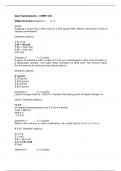
-
CHEM133 Week 7 Midterm Exam (March)
- Exam (elaborations) • 9 pages • 2023
-
- $31.49
- + learn more
1. Question: Suppose a house has a floor area of 2,250 square feet. What is this area in units of square centimeters? 2. Question: A piece of antimony with a mass of 17.41 g is submerged in 46.3 cm3 of water in a graduated cylinder. The water level increases to 48.9 cm3. The correct value for the density of antimony from these data is: 3. Question: Liquid nitrogen boils at –195.8°C. Express the boiling point of liquid nitrogen in kelvin. 4. Question: What is the volume, in cubic centimeter...

-
CHEM133 Week 7 Midterm Exam (March)
- Exam (elaborations) • 9 pages • 2023
-
- $30.49
- + learn more
1. Question: Suppose a house has a floor area of 2,250 square feet. What is this area in units of square centimeters? 2. Question: A piece of antimony with a mass of 17.41 g is submerged in 46.3 cm3 of water in a graduated cylinder. The water level increases to 48.9 cm3. The correct value for the density of antimony from these data is: 3. Question: Liquid nitrogen boils at –195.8°C. Express the boiling point of liquid nitrogen in kelvin. 4. Question: What is the volume, in cubic centimeter...
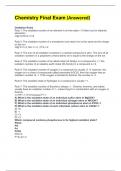
-
Chemistry Final Exam (Answered)
- Exam (elaborations) • 34 pages • 2023
-
- $14.49
- + learn more
Chemistry Final Exam (Answered) Oxidation Rules Rule 1: The oxidation number of an element in its free state = 0 (Also true for diatomic elements) -Mg=0,H2=0, C=0 Rule 2: The oxidation number of a monatomic (one-atom) ion is the same as the charge on the ion -Mg^2+=+2, Na^+=+1, O^2-=-2 Rule 3: The sum of all oxidation numbers in a neutral compound is zero. The sum of all oxidation numbers in a polyatomic (many-atom) ion is equal to the charge on the ion. Rule 4: The oxidation numb...
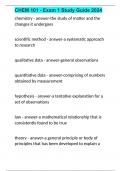
-
CHEM 101 - Exam 1 Study Guide 2024.
- Exam (elaborations) • 30 pages • 2024
-
- $7.99
- + learn more
chemistry - answer-the study of matter and the changes it undergoes scientific method - answer-a systematic approach to research qualitative data - answer-general observations quantitative data - answer-comprising of numbers obtained by measurement hypothesis - answer-a tentative explanation for a set of observations law - answer-a mathematical relationship that is consistently found to be true theory - answer-a general principle or body of principles that has been developed to...
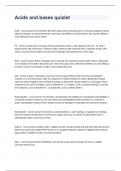
-
Acids and bases quizlet questions with verified solutions 2023/2024
- Exam (elaborations) • 2 pages • 2023
- Available in package deal
-
- $9.99
- + learn more
Acids and bases Acids - correct answer An acid (from the Latin acidus/acēre meaning sour) is a chemical substance whose aqueous solutions are characterized by a sour taste, the ability to turn blue litmus red, and the ability to react with bases and certain metals PH - correct answer pH is a measure of how acidic/basic water is. The range goes from 0 - 14, with 7 being neutral. pHs of less than 7 indicate acidity, whereas a pH of greater than 7 indicates a base. pH is really a measure of the...
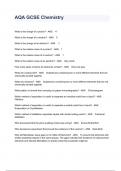
-
AQA GCSE Chemistry
- Exam (elaborations) • 19 pages • 2023
- Available in package deal
-
- $11.49
- + learn more
AQA GCSE Chemistry What is the charge of a proton? - ANS +1 What is the charge of a neutron? - ANS 0 What is the charge of an electron? - ANS -1 What is the relative mass of a proton? - ANS 1 What is the relative mass of a neutron? - ANS 1 What is the relative mass of an electron? - ANS Very small How many types of atoms do elements contain? - ANS Only one type What are compounds? - ANS Substances containing two or more different elements that...
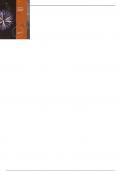
-
Test Bank For Chemistry And Chemical Reactivity International Edition 8th Edition By John C. Kotz
- Exam (elaborations) • 300 pages • 2023
- Available in package deal
-
- $33.31
- + learn more
Chapter 1—Basic Concepts of Chemistry MULTIPLE CHOICE 1. A hypothesis is a a. mathematical formula that models a pattern of behavior. b. concise statement of a behavior that is always the same under the same conditions. c. set of experiments designed to test a theory. d. well-tested, unifying principle that explains a body of facts. e. tentative explanation or prediction based upon experimental observations. ANS: E 2. A theory is a a. concise statement of a behavior that is always t...
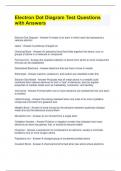
-
Electron Dot Diagram Test Questions with Answers
- Exam (elaborations) • 2 pages • 2024
- Available in package deal
-
- $8.79
- + learn more
Electron Dot Diagram Test Questions with Answers Electron Dot Diagram - Answer-A model of an atom in which each dot represents a valence electron cation - Answer-A positively charged ion Chemical Bond - Answer-An attractive force that holds together the atoms, ions, or groups of atoms in a molecule or compound. Formula Unit - Answer-the simplest collection of atoms from which an ionic compound's formula can be established Delocalized Electrons - Answer-electrons that are free to move...

-
CHEM133 Week 7 Midterm Exam: 100% Score
- Exam (elaborations) • 9 pages • 2023
- Available in package deal
-
- $45.07
- + learn more
1. Question: Suppose a house has a floor area of 2,250 square feet. What is this area in units of square centimeters? 2. Question: A piece of antimony with a mass of 17.41 g is submerged in 46.3 cm3 of water in a graduated cylinder. The water level increases to 48.9 cm3. The correct value for the density of antimony from these data is: 3. Question: Liquid nitrogen boils at –195.8°C. Express the boiling point of liquid nitrogen in kelvin. 4. Question: What is the volume, in cubic centimeter...

How did he do that? By selling his study resources on Stuvia. Try it yourself! Discover all about earning on Stuvia


